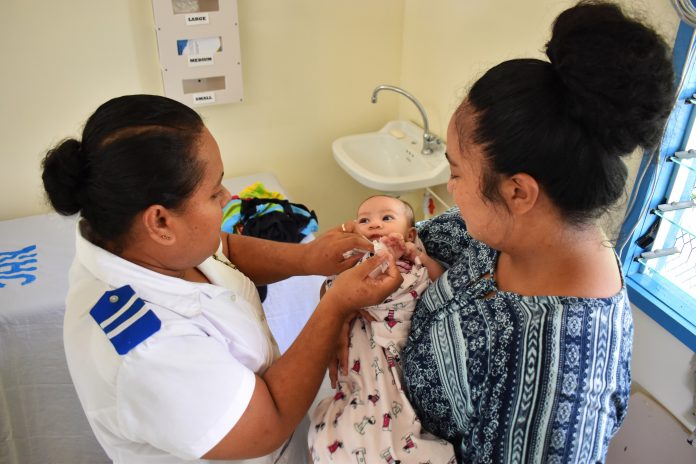The rollout of vaccines to protect children against cervical cancer, pneumonia, and rotavirus has begun in Samoa, Tonga, and Tuvalu.
The deployment of these three vaccines is part of the US$29.7 million System Strengthening for Effective Coverage of New Vaccines in the Pacific Project, which is supporting the introduction of these vaccines in Samoa, Tonga, Tuvalu, and Vanuatu. Financed by the Asian Development Bank (ADB), the vaccine project was originally established to support the procurement of rotavirus, pneumococcal conjugate, and human papilloma virus (HPV) vaccines through the United Nations Children’s Fund (UNICEF).
The project is supporting the health ministries in immunising 90,700 children against pneumonia, 71,600 children against rotavirus, and 84,200 adolescent girls against HPV infections across the four countries. The project is also helping update national immunization and cold chain policies, upgrade cold chain equipment and supply chain logistics, improve immunization reporting systems, and undertake other health system strengthening activities essential to reducing pneumonia, rotavirus, and HPV infections.
“This established vaccines project continues to make good progress, improving overall immunization coverage rates, supporting greater efficiency of primary health services, and raising community awareness at a time which is critical when much of the globe is being adversely affected by the coronavirus disease (COVID-19),” said Regional Director of ADB’s Pacific Subregional Office in Fiji Masayuki Tachiiri. “It will also help to strengthen the region’s resilience against other infectious diseases in consideration to reopening of borders and economies.”
“While the focus of the world is understandably on boosting immunisation against COVID-19, we can’t afford to trade one health crisis for another,” said UNICEF Pacific Representative Sheldon Yett. “We thank ADB for its continued and strengthened partnership in the Pacific and working with UNICEF to protect children and young people from these vaccine-preventable diseases.”
In the Pacific, pneumonia and diarrhea are two of the top three causes for mortality in children under 5 years of age, and about one-third of all pneumonia deaths are due to the pneumococcus bacteria, which is usually transmitted through contact with infected children. Rotaviruses are the leading cause of severe diarrhea in children aged less than 5 years.
Cervical cancer has also been reported as one of the top three regional priorities by Pacific leaders, with over a thousand cervical cancer cases each year.
The project also recently received additional financing to support the four countries in the introduction of COVID-19 vaccines. The project provides an established platform to safely introduce COVID-19 vaccines in the countries, strengthen health systems, and raise community awareness.
SOURCE: ADB/PACNEWS














